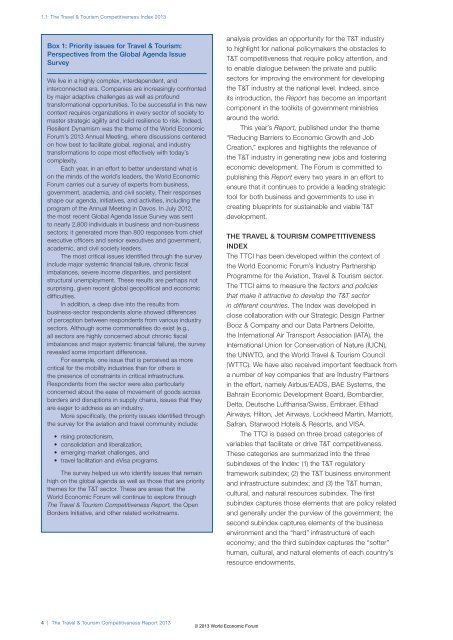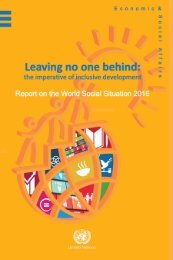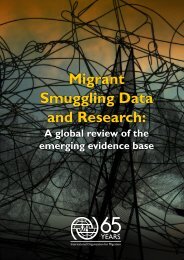The Travel & Tourism Competitiveness Report 2013
The Travel & Tourism Competitiveness Report 2013
The Travel & Tourism Competitiveness Report 2013
Create successful ePaper yourself
Turn your PDF publications into a flip-book with our unique Google optimized e-Paper software.
1.1: <strong>The</strong> <strong>Travel</strong> & <strong>Tourism</strong> <strong>Competitiveness</strong> Index <strong>2013</strong><br />
Box 1: Priority issues for <strong>Travel</strong> & <strong>Tourism</strong>:<br />
Perspectives from the Global Agenda Issue<br />
Survey<br />
We live in a highly complex, interdependent, and<br />
interconnected era. Companies are increasingly confronted<br />
by major adaptive challenges as well as profound<br />
transformational opportunities. To be successful in this new<br />
context requires organizations in every sector of society to<br />
master strategic agility and build resilience to risk. Indeed,<br />
Resilient Dynamism was the theme of the World Economic<br />
Forum’s <strong>2013</strong> Annual Meeting, where discussions centered<br />
on how best to facilitate global, regional, and industry<br />
transformations to cope most effectively with today’s<br />
complexity.<br />
Each year, in an effort to better understand what is<br />
on the minds of the world’s leaders, the World Economic<br />
Forum carries out a survey of experts from business,<br />
government, academia, and civil society. <strong>The</strong>ir responses<br />
shape our agenda, initiatives, and activities, including the<br />
program of the Annual Meeting in Davos. In July 2012,<br />
the most recent Global Agenda Issue Survey was sent<br />
to nearly 2,800 individuals in business and non-business<br />
sectors; it generated more than 800 responses from chief<br />
executive officers and senior executives and government,<br />
academic, and civil society leaders.<br />
<strong>The</strong> most critical issues identified through the survey<br />
include major systemic financial failure, chronic fiscal<br />
imbalances, severe income disparities, and persistent<br />
structural unemployment. <strong>The</strong>se results are perhaps not<br />
surprising, given recent global geopolitical and economic<br />
difficulties.<br />
In addition, a deep dive into the results from<br />
business-sector respondents alone showed differences<br />
of perception between respondents from various industry<br />
sectors. Although some commonalities do exist (e.g.,<br />
all sectors are highly concerned about chronic fiscal<br />
imbalances and major systemic financial failure), the survey<br />
revealed some important differences.<br />
For example, one issue that is perceived as more<br />
critical for the mobility industries than for others is<br />
the presence of constraints in critical infrastructure.<br />
Respondents from the sector were also particularly<br />
concerned about the ease of movement of goods across<br />
borders and disruptions in supply chains, issues that they<br />
are eager to address as an industry.<br />
More specifically, the priority issues identified through<br />
the survey for the aviation and travel community include:<br />
• rising protectionism,<br />
• consolidation and liberalization,<br />
• emerging-market challenges, and<br />
• travel facilitation and eVisa programs.<br />
<strong>The</strong> survey helped us wto identify issues that remain<br />
high on the global agenda as well as those that are priority<br />
themes for the T&T sector. <strong>The</strong>se are areas that the<br />
World Economic Forum will continue to explore through<br />
<strong>The</strong> <strong>Travel</strong> & <strong>Tourism</strong> <strong>Competitiveness</strong> <strong>Report</strong>, the Open<br />
Borders Initiative, and other related workstreams.<br />
4 | <strong>The</strong> <strong>Travel</strong> & <strong>Tourism</strong> <strong>Competitiveness</strong> <strong>Report</strong> <strong>2013</strong><br />
analysis provides an opportunity for the T&T industry<br />
to highlight for national policymakers the obstacles to<br />
T&T competitiveness that require policy attention, and<br />
to enable dialogue between the private and public<br />
sectors for improving the environment for developing<br />
the T&T industry at the national level. Indeed, since<br />
its introduction, the <strong>Report</strong> has become an important<br />
component in the toolkits of government ministries<br />
around the world.<br />
This year’s <strong>Report</strong>, published under the theme<br />
“Reducing Barriers to Economic Growth and Job<br />
Creation,” explores and highlights the relevance of<br />
the T&T industry in generating new jobs and fostering<br />
economic development. <strong>The</strong> Forum is committed to<br />
publishing this <strong>Report</strong> every two years in an effort to<br />
ensure that it continues to provide a leading strategic<br />
tool for both business and governments to use in<br />
creating blueprints for sustainable and viable T&T<br />
development.<br />
THE TRAVEL & TOURISM COMPETITIVENESS<br />
INDEX<br />
<strong>The</strong> TTCI has been developed within the context of<br />
the World Economic Forum’s Industry Partnership<br />
Programme for the Aviation, <strong>Travel</strong> & <strong>Tourism</strong> sector.<br />
<strong>The</strong> TTCI aims to measure the factors and policies<br />
that make it attractive to develop the T&T sector<br />
in different countries. <strong>The</strong> Index was developed in<br />
close collaboration with our Strategic Design Partner<br />
Booz & Company and our Data Partners Deloitte,<br />
the International Air Transport Association (IATA), the<br />
International Union for Conservation of Nature (IUCN),<br />
the UNWTO, and the World <strong>Travel</strong> & <strong>Tourism</strong> Council<br />
(WTTC). We have also received important feedback from<br />
a number of key companies that are Industry Partners<br />
in the effort, namely Airbus/EADS, BAE Systems, the<br />
Bahrain Economic Development Board, Bombardier,<br />
Delta, Deutsche Lufthansa/Swiss, Embraer, Etihad<br />
Airways, Hilton, Jet Airways, Lockheed Martin, Marriott,<br />
Safran, Starwood Hotels & Resorts, and VISA.<br />
<strong>The</strong> TTCI is based on three broad categories of<br />
variables that facilitate or drive T&T competitiveness.<br />
<strong>The</strong>se categories are summarized into the three<br />
subindexes of the Index: (1) the T&T regulatory<br />
framework subindex; (2) the T&T business environment<br />
and infrastructure subindex; and (3) the T&T human,<br />
cultural, and natural resources subindex. <strong>The</strong> first<br />
subindex captures those elements that are policy related<br />
and generally under the purview of the government; the<br />
second subindex captures elements of the business<br />
environment and the “hard” infrastructure of each<br />
economy; and the third subindex captures the “softer”<br />
human, cultural, and natural elements of each country’s<br />
resource endowments.<br />
© <strong>2013</strong> World Economic Forum

















